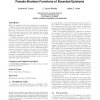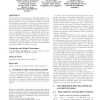GECCO
2011
Springer
12 years 7 months ago
2011
Springer
In continuous optimisation, surrogate models (SMs) are used when tackling real-world problems whose candidate solutions are expensive to evaluate. In previous work, we showed that...
GECCO
2011
Springer
12 years 7 months ago
2011
Springer
The reward functions that drive reinforcement learning systems are generally derived directly from the descriptions of the problems that the systems are being used to solve. In so...
GECCO
2011
Springer
12 years 7 months ago
2011
Springer
In genetic programming, the reproductive operators of crossover and mutation both require the selection of nodes from the reproducing individuals. Both unbiased random selection a...
GECCO
2011
Springer
12 years 7 months ago
2011
Springer
Computing unique input-output sequences (UIOs) from finite state machines (FSMs) is important for conformance testing in software engineering, where evolutionary algorithms (EAs)...
GECCO
2011
Springer
12 years 7 months ago
2011
Springer
The rate of speciation is in most mammals an order of magnitude faster than in most other vertebrates. It is faster still in the social mammals. The apparent association between c...
GECCO
2011
Springer
12 years 7 months ago
2011
Springer
—A number of representation schemes have been presented for use within Learning Classifier Systems, ranging from binary encodings to Neural Networks, and more recently Dynamical ...
GECCO
2011
Springer
12 years 7 months ago
2011
Springer
In recent years there have been efforts to develop a probabilistic framework to explain the workings of a Learning Classifier System. This direction of research has met with lim...
GECCO
2011
Springer
12 years 7 months ago
2011
Springer
When the epistasis of the fitness function is bounded by a constant, we show that the expected fitness of an offspring of the (1+1)-EA can be efficiently computed for any point...
GECCO
2011
Springer
12 years 7 months ago
2011
Springer
Software projects often fail because stakeholder communication and involvement are inadequate. This paper proposes a novel method to understand project social networks and their c...
GECCO
2011
Springer
12 years 7 months ago
2011
Springer
We introduce the Spacing Memetic Algorithm (SMA), a formal evolutionary model devoted to a systematic control of spacing (distances) among individuals. SMA uses search space dista...






